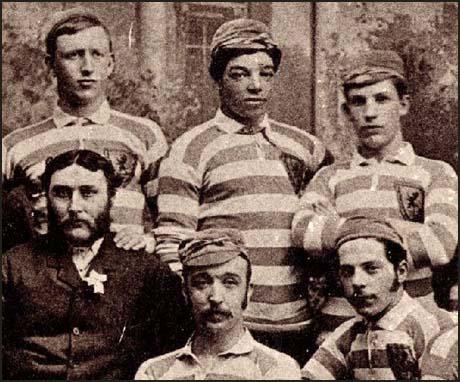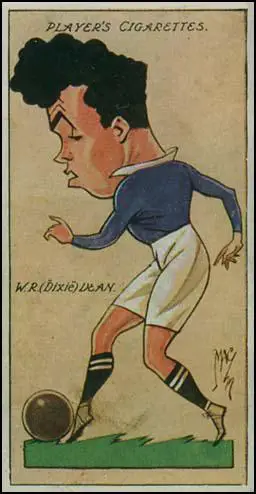Racism and Football: 1880-1945
There is little evidence of racism in the early days of football. The first black player to play top level football in Britain was Andrew Watson. On 12th March 1881 Watson was appointed captain of Scotland and only lost his place in the team when he decided to play his football in England.

Arthur Wharton, who played in goal for Preston North End (1886-89) appeared to be popular with the fans. However, an article in the Athletic Journal on 29th October, 1887, it was stated: "Good judges say that if Wharton keeps goal for Preston North End in their English Cup tie the odds will be considerably lengthened against them. I am of the same opinion ... Is the darkie's pate too thick for it to dawn upon him that between the posts is no place for a skylark? By some it's called coolness - bosh!"
In 1908 Tottenham Hotspur signed Walter Tull, a 20 year old apprentice printer. Tull scored 2 goals in 10 games in the 1909-1910 season before being transferred for a large fee to Northampton Town. He was extremely popular with the home fans but suffered racial abuse from the opposition. The Northampton Echo (9th October, 1909) reported that in a game against Bristol City: "A section of the spectators made a cowardly attack upon him (Walter Tull) in language lower than Billingsgate...Let me tell these Bristol hooligans (there were but few of them in a crowd of nearly twenty thousand) that Tull is so clean in mind and method as to be a model for all white men who play football whether they be amateur or professional. In point of ability, if not in actual achievement, Tull was the best forward on the field."
One of the most popular footballers in the 1920s was William Dean. However, he was commonly known as "Dixie Dean". This was a reference to his dark complexion and his curly black hair. Dean hated being called "Dixie" and insisted that his friends and acquaintances used his real name. His biographer, Nick Walsh, argues in Dixie Dean: The Official Biography of a Goalscoring Legend (1977) that Dean felt that the term "had connections with colour problems connected with the Southern states of America, and therefore contained an inference that he was of that origin, or half-caste."

Dixie Dean was leaving the pitch after a game in 1938 when a spectator called out: "We will get you yet, you black bastard." Dean went over to him and punched him in the face. A policeman came running over but instead of arresting him, shook him by the hand.
Primary Sources
(1) Athletic Journal (29th October, 1887)
Good judges say that if Wharton keeps goal for Preston North End in their English Cup tie the odds will be considerably lengthened against them. I am of the same opinion ... Is the darkie's pate too thick for it to dawn upon him that between the posts is no place for a skylark? By some it's called coolness - bosh!'
(2) Northampton Echo (9th October, 1909)
A section of the spectators made a cowardly attack upon him (Walter Tull) in language lower than Billingsgate...Let me tell these Bristol hooligans (there were but few of them in a crowd of nearly twenty thousand) that Tull is so clean in mind and method as to be a model for all white men who play football whether they be amateur or professional. In point of ability, if not in actual achievement, Tull was the best forward on the field.
(3) Nick Walsh, Dixie Dean: The Official Biography of a Goalscoring Legend (1977)
The reason (why he disliked being called Dixie) was that at the time he felt "Dixie" had connections with colour problems connected with the Southern states of America, and therefore contained an inference that he was of that origin, or half-caste.
